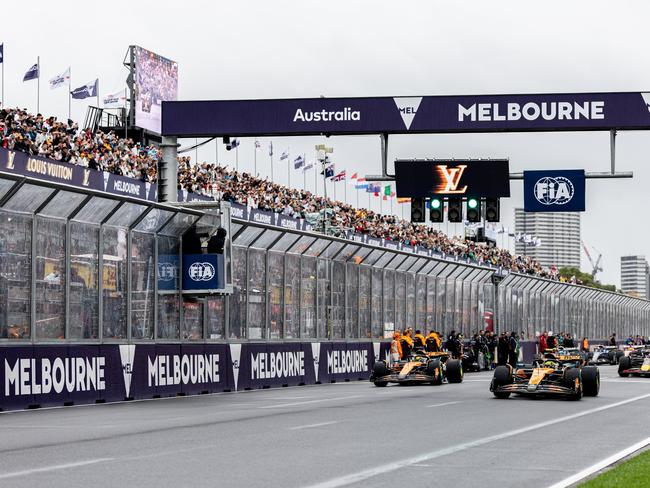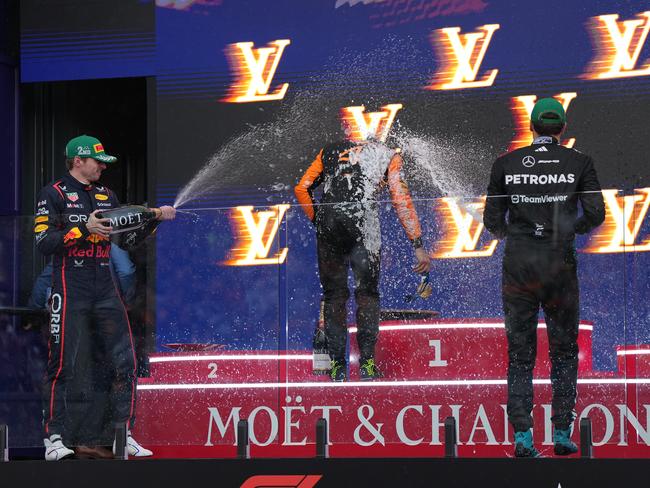What happens to the F1 now?
The F1 Louis Vuitton Australian Grand Prix broke new ground – what happens next?

Now that the thrum and whine of the cars have gone silent, the drivers with their entourages have long since jetted off to the next race, and the fans have (maybe) put away their caps and sweatshirts, how successful was this year’s Formula One Louis Vuitton Australian Grand Prix in Melbourne?
For Travis Auld, chief executive of the Australian Grand Prix Corporation, this can be measured in several ways. For one, there was a record crowd through the gates – 465,498, up from last year’s previous record of 452,055. Many of them, as has been reported, were women and a younger demographic than the sport used to attract.
It also reached its highest TV viewership figures for both Channel 10 and Foxtel (which doesn’t report its figures but told Raceweek “Sunday’s Formula 1 race achieved the highest race audience ever across Foxtel Group platforms, Kayo Sports, Foxtel, Foxtel Go and Foxtel Now”). According to data from sports measurement and analytics agency Nielsen Analytics, F1 is now the world’s most followed sport.
Auld judges success in other ways too. Including the opportunity he sees in bringing the best of Melbourne – such as activations from the likes of St Ali and Movida – to the racetrack, as well as the “park pass” concept where punters can buy a ticket to experience the vibe of the circuit. Success too comes in ensuring the race has a positive impact on the Victorian people, and Melbourne more broadly.
“We are very mindful that part of our responsibility is to deliver an economic benefit back to Victoria. And so some of the things we spoke about, such as taking the event into the city, building that vibe throughout Melbourne is a big part of that,” says Auld.
“We’ve undertaken various studies of the economic impact. The most recent one was in 2023 where the event generates about $270m of economic benefit for Victoria.
“Now, I can say all those things because I’m the CEO of the Australian Grand Prix, you would expect me to, but what really matters is if you talk to local hotels and local restaurants, transport providers, and ask them whether the event brings value to them. In the conversations I’ve had with various restaurant owners and hoteliers and just small businesses, even in and around the circuit, coffee shops close to Albert Park, it has significant impact on their business during that period.”
One business figure to reap the reward is restaurateur Chris Lucas, owner of some of Melbourne’s hottest restaurants, including Societe and the newly opened Maison Batard.

Lucas says the trickle-down effect from the sport’s new 10-year major partner – luxury conglomerate LVMH, with its marquee brand, Louis Vuitton, awarded naming rights for Melbourne – elevated this impact.
Lucas’s Maison Batard restaurant hosted an event for Belvedere Vodka, one of LVMH’s brands and the official vodka of the F1. Its Champagne house, Moet & Chandon, is also back as the official Champagne – for both hospitality and the traditional podium celebrations.
Lucas says business was up 50 per cent in this period.
“I think the involvement of LVMH as the pre-eminent global brand has taken the event to another level, certainly in terms of brand involvement and opening the Melbourne Grand Prix up to the world in terms of fashion and other key brands that they own … I think it attracted a global market that we probably haven’t seen before,” he says.
It’s a similar story for the five-star The Ritz-Carlton hotel.
Rachael Harman, general manager of The Ritz Carlton, says the F1 is shaping up to be a huge drawcard for visitors.
“It was a huge success for The Ritz-Carlton Melbourne in a multitude of ways, including increased hotel occupancy with double-digit growth year on year, converting new prospects to the hotel, and on-track visibility with our Atria ‘pop-up’ restaurant within the American Express Lounge,” she says.
“We continue to see guests prioritising global events such as F1 as non-discretionary leisure experiences, choosing to extend their stay and make the most of this world-class event.”
Balancing an influx of luxury – and its associated patronage – with ensuring the event remains accessible is something Auld grapples with.
“That is something we spend a lot of time working through. So whether that’s from a pricing point of view through (to) an accessibility point of view … there are ways, and it’s a large space, so there’s lots of ways you can interact with the event,” he says.
Challenges, he says, will include meeting demand and managing that against affordability.
“Hosting big events has certainly become more expensive over the last five or six years. Just managing the cost of hosting events is one of the challenges. And then it’s just making sure that we continue to innovate and improve the experience, that, where we can, keep listening to our fans as to the areas we need to invest in, things we’ve got to get better at. But also innovating in a way that when fans have been coming for a number of years, it’s a different experience each year. That’s something that’s at the forefront of our minds.”
Next year’s plans already include managing logistics around shade, traffic flow and improving on the precinct concept.
As for what the future of F1 looks like more broadly, Auld says Formula One (owned by Liberty Media) has big plans.
“They’ve got a very strong growth mindset, is what I would say. They’re very ambitious. They’ve done incredible things with the sport,” he says.
“And they feel like they’re only getting started, I suspect. So they have lofty ambitions. We support those, but they’re also a very well resourced, very professional organisation. So I think together we work pretty well to continue to grow the event.”





To join the conversation, please log in. Don't have an account? Register
Join the conversation, you are commenting as Logout